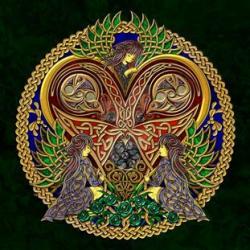 Whether we know it or not, or admit it or not, all persons operate with presuppositions about all topics, and theology is no different. If a person believes there is no God, that person will view the world from that presupposition. A person who believes that God exists but that we cannot truly know him, will perceive differently than an atheist. If we believe that God is real, and that God can be known, it will give us altogether another way of seeing the world.
Whether we know it or not, or admit it or not, all persons operate with presuppositions about all topics, and theology is no different. If a person believes there is no God, that person will view the world from that presupposition. A person who believes that God exists but that we cannot truly know him, will perceive differently than an atheist. If we believe that God is real, and that God can be known, it will give us altogether another way of seeing the world.
Our presuppositions certainly guide and inform us and our worldview. Our presuppositions are typically rooted in the evidence we have found to support such a presupposition and this, in turn, informs our outlook and informs us on which side of issues we take and what we believe.
Presuppositions are found in any theology, and Celtic theology is no different. At its core, the well-read theologian may see little to no difference in Celtic presuppositions than as are seen in other Christian denominations or practices. It is in some distinctives where the biggest differences are seen. Celtic theology, like any other form of theology has basic and interpretive presuppositions. These are important to know and understand to comprehend more intricate details of this theology.
The Basic Presupposition of Trinity
Celtic theology teaches, and as we will see later is extremely comfortable with, a Trinitarian God. This belief is taken directly from The Bible. However, it is also taken from the shared historical experience of God amongst the Celtic peoples. A basic presupposition is that The Bible must be true. If the scriptures are not true, then the entirety of this this first presupposition will fall in on itself, taking the entire theology with it.
If a Triune God does not exist, there is no Christ, there is no Holy Spirit, no plan for salvation and reunification and thus no hope to be found in this system of belief. We primarily learn this from the Holy Scripture, but we can experience it through nature and our human minds. It’s this experiential portion that is very unique to the Celtic view of Trinity. But the basic presupposition remains, that the Bible is truthful and faithful to the person of the Triune God.
Interpretive Presuppositions
Like stones laid in a path, Celtic Theology rests on its source material and begins its journey on the stones of interpretation. This interpretation rests in two parts. The first, is accurate exegesis of the scripture. Exegesis must be done to ensure biblical accuracy. The second, a distinctive to Celtic Theology, is the application and experience of the believer during the journey of their life that “fleshes out” the truth found in the scriptures. Comprehension and Experience make up the mortar of which the stones in the Celtic journey are built.
Yet even though Celtic Theology puts a premium on the experiential, normative interpretation is still key for proper exegesis. In Gods general and special revelations, it is Gods desire to communicate with us the truth. God does not intend to obscure the journey but enhance it with God’s truth. Normative truth relies on canons of interpretation. When we look at scripture, we view it from the basic understanding that God has caused it to be written for the purpose of communication in language that we can understand, using the historical context of the scripture to speak to us today. Attempting to remove scripture from its original context will result in confused and improper exegesis that has often characterized the gross misinterpretations in history.
From the inquisitions, to the Salem Witch Trials, slavery and oppression of peoples has often been the cornerstone of gross interpretation devoid of contextual applications. The damage done by Christians in the world is the direct result of a failure to interpret with contextual understanding.
Priority of The New Testament concerning Salvation as a Presupposition
All Scripture is indeed inspired and profitable, but the understanding of salvation, explained in the New Testament with the foundation of the Old Testament and Deuterocanonical books, takes precedence. Old Testament revelation is the path by which The New Testament, specifically the doctrine of salvation, is described and inerrantly revealed. This is not a minimization of the Old Testament or the Deuterocanonical books, or to imply they are not divinely inspired. Rather it is to state that these texts created the canon and context by which we understand in full, the doctrine of salvation for the world through the Triune God, Specifically, Jesus Christ. Old Testament concepts and theology are particularly important, but are incomplete without the New Testament, specifically the understanding of salvation.
Presuppositions of One’s Self
For a person to comprehend those sacred things in theology that person must believe. A believer will have insights of the heart that the unbeliever is not interested in and not open to. The movement of the Holy Spirit in the life of the believer leads them to a deeper and more real understanding of the theological and makes it personal.
The believer must think exegetically, or in other words, to search for a more precise meaning when dealing with scripture. Further the believer must be able to meditate and seek personal space with the creator to think on these things to apply them in the journey of life. Exegesis, as a human practice cannot provide all the answers, but a person with a firm foundation, open to the Holy Spirit can fully understand over time the purposes and intent the Father has for His children.
Looking for Purpose in All We Encounter
The believer must depend on the Holy Spirit, and not rely solely on their intellect to understand scripture or to prepare for their journey. The frame of scripture can bring us to all truth, but we must be open to the Holy Spirit who is all truth. Relying on one’s intellect and some scripture verses, removes the sacred from the process and leaves the believer simply religious and not a person of faith.
The believer must worship God, in prayer, song and deed. Without this, theology simply is an academic matter and has no actual spiritual, mystical, or religious purpose. Without the act of worship, theology is simply words on a paper that have no critical meaning. The believer should see the sacred in theology as they do in anything. A distinctive of Celtic theology is looking for God and Gods purpose in every single thing we encounter.
Presuppositions of Celtic Christianity
Although hotly debated, this book takes the position that a totally unique Celtic spirituality, faith, and practice did exist between the 5th and 12th centuries but did not exist as an independent church. As such, a presupposition is that Celtic Theology is not new, but it is also not extinct. The theology described in this book is a reclamation as much as it is a theology. As such, the Celtic theology in the modern world does seek to reclaim its ancient distinctives. The Celtic churches were orthodox in faith but diverse in practice. It evangelized through unity and friendship, especially with the unbeliever. Even as early as the 5th century Celtic churches “respected women’s spiritual gifting, felt spiritually linked to Gods creation and celebrated God through all the senses.’ (Simpson, 1994).
To learn about the author, his ministries and work, click here
To Purchase the book “Timeless Theology” click here










